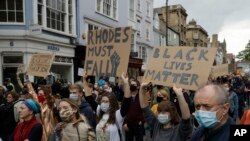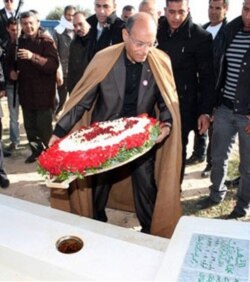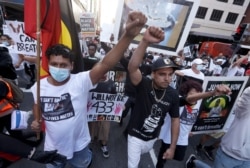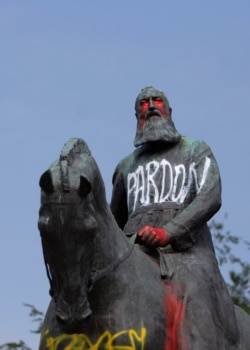The death of George Floyd and the subsequent anti-racism protests sweeping the U.S. are being latched onto by African and ethnic minorities elsewhere — from Iraq to Britain, from Canada to Australia — to boost awareness of their own struggles to overcome endemic racial prejudice.
The death of Floyd, an African American man who died in police custody after a white police officer knelt on his neck for more than eight minutes, has prompted large “Black Lives Matter” protests in dozens of countries around the world, many of them ignoring coronavirus social distancing rules.
Some rights activists say Floyd’s death might one day be compared in terms of its wider impact to the 2010 self-immolation of Tunisian Mohamed Bouazizi, a street-hawker who doused himself with gasoline and set himself on fire to protest the confiscation of his goods by police.
His death was a catalyst for the Arab Spring, a series of anti-government protests and rebellions that hit much of the Arab world in the early 2010s.
Both cases unleashed “tremendous popular energy,” according to Juan Cole, a historian at the University of Michigan. In Tunisia’s case, “a small drama unfolded that would change the world, and certainly would change Tunisia,” he wrote in a recent commentary.
Speaking Tuesday at Floyd’s funeral in Houston, his brother, Rodney, sought to comfort mourners, saying “everybody is going to remember him around the world. He is going to change the world.”
Boost for own campaigns
And as the impact of Floyd’s death in Minneapolis cascades around the world, rights activists and ethnic minority campaigners say they’re drawing inspiration from the mostly peaceful protests in the U.S., which are breathing new life into their own demands for racial justice.
In many cases protesters outside America have been focusing their ire as much on police brutality or racial discrimination in their own countries as on Floyd’s death, warning their own leaders not to see racial prejudice as exclusively an American problem and inviting them to look at their own records of minority deaths in custody.
In Australia, thousands marched last week in solidarity with their counterparts in the U.S., but highlighted mostly the deaths of indigenous people in police custody in Australian police stations and prisons — by one count, 434 have died since 1991, including a 40-year-old Aboriginal man in a prison outside Perth in western Australia as the marches kicked off.
Many of Australia’s protesters chanted, “Justice today, for David Dungay,” a 26-year-old Aboriginal man who, like Floyd, said, “I can’t breathe,” as he died in 2015 while being restrained by prison guards. Some banners at a rally in Australia read: “Same story, different soil.” Aboriginal people remain the most incarcerated in the world by percentage of population — while making up just 3 percent of the nation's population, they account for 30 percent of those currently held in Australia’s prisons.
One demonstrator in Sydney, Leon Saunders, 77, told the BBC: “The raw deal Aborigines have been getting in this country for my lifetime and many lifetimes before — that is just not right. We can look at America and say what terrible things are happening over there, but right here on our home soil, there are just as bad things happening and they need to be improved.”
Mexico, Iraq
In Mexico City, demonstrators demanded justice for a construction worker, Giovanni Lopez, who was allegedly beaten to death in police custody last month. In Iraq, activists hope to raise awareness about the rights of more than 400,000 African Iraqis and are trying to trigger a public debate about their lack of political representation in government. Many African Iraqis can trace their origins to the Abbasid caliphate after the year 750 when thousands were transported from East Africa as slaves.
In the British port city of Bristol, the statue of a 17th-century slave trader was toppled and dumped in the harbor. Britain has also had its share of black men dying in police custody — 13 since 2010. The names of those 13 were written on many placards held up at rallies in London.
Following protests in Britain — there were more than 200 last week attended by an estimated 137,500 people — Prime Minister Boris Johnson on Monday acknowledged the “cold reality” that black and other ethnic minority groups face discrimination in education, employment and criminal law.
Speaking on Britain’s Sky News, Marcia Rigg — whose brother, Sean Rigg, died after being arrested in 2008 — said, “I welcome the protests, but where have the protesters been all these years in the U.K.? They've never supported us enough, and I would like that support again from the U.K. … We need to clean up our own backyard.”
An independent review in 2017 of deaths and serious incidents in police custody found that where use of force or restraint was applied by British police, black and minority individuals were twice as likely to die as their white counterparts.
In Belgium as in Britain and elsewhere in Europe, the Floyd protests have forced a racist past to be confronted, prompting demands for continuing racial prejudice to be tackled. Statues memorializing colonial figures have been targeted in Belgium, including one of King Leopold II.
Primrose Ntumba, an assistant in the parliament in Brussels, told broadcasters that Floyd’s death had given momentum to efforts to get the country to acknowledge Belgium’s colonial history. “We have a lot of history that a lot of people don’t know about and it really impacts people of color and particularly black people in Belgium,” she said.
“A lot of the white majority citizens in Belgium do not understand why black people are so angry, because they have never been taught about it,” Ntumba said.
She and other rights activists said events in the U.S. serve as a mirror that can be turned around for an examination of racial prejudice in their countries.
Western foes
The governments of some — especially U.S. and Western foes — have used the Floyd's death to claim their own race relations are more equitable. State-controlled media in China, Iran and Russia have all given extensive coverage to the U.S. and Western protests, focusing on the small-scale violence that unfolded in a handful of U.S. cities and some European towns, notably London and Hamburg, but largely overlooking the overwhelming peacefulness of most demonstrations, say observers.
And leaders in Moscow, Tehran and Beijing have seized on the tumult as an opportunity to accuse the U.S. and West of operating under double standards. Chinese officials have been comparing the U.S. unrest to the pro-democracy demonstrations in Hong Kong, where Beijing is poised to limit political freedoms.
The U.S. envoy to the United Nations, Kelly Craft, has rejected the accusations of hypocrisy. She said Friday: “There’s no moral equivalence between our free society, which works through tough problems like racism, and other societies, which do not allow anything to be discussed because they are authoritative regimes.” She cited the forcible detention in “re-education camps” of more than a million Uighurs in western China.












